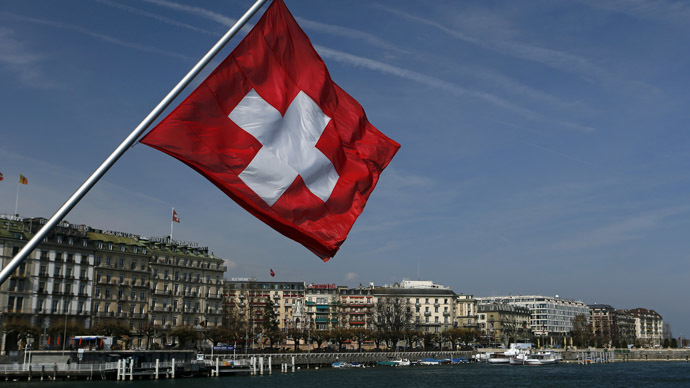Switzerland first to sell 10-year bonds with negative yield

Switzerland has become the first country to auction off 10-year bonds with a negative yield, as the country is fighting the risk of deflation.
The Swiss Federal Treasury on Wednesday sold 232.501 million Swiss francs ($242 million) of bonds maturing in July 2025 at a yield of -0.055 percent. The bonds carry a 1.5 percent interest rate.
READ MORE: Record deflation in eurozone
By issuing a 10-year debt that gives investors a yield under 0 percent the Swiss government has effectively made investors pay for the privilege of lending to it for such a long period. Swedish and Danish debt carry negative yields out to about five years. Even Japanese 10-year bonds’ yields have never gone negative considering the country has been battling deflation since 1990s.
More Twilight Zone Action: #Swiss gov issues 10-year #bonds at a negative #yield. My head spins pic.twitter.com/imGKi0INe8
— Mark W Guthner, CFA (@MGuthner) April 8, 2015
“The combination of deflationary fears and aggressive central bank action has caused investors to accept the reality of negative yield bonds,” Jeffrey Sica, chief investment officer of US-based Circle Squared Alternative Investments told the WSJ. An auction with a negative yield “signals a lack of confidence from investors that the economy will be growing in the short-term,” he added.
READ MORE: Swiss franc skyrockets to record level after central bank removes euro peg
The Swiss National Bank (SNB) scrapped its upper limit on the value of the franc in January which led to the Swiss currency’s surge. The SNB’s decision shook world markets, while the Swiss franc has added more than 15 percent against the euro.
READ MORE: Swiss central bank turns to negative interest rate amid ruble crisis
Export and import rates are equivalent to nearly 70 percent and 60 percent of GDP in Switzerland. The sharp appreciation of Swiss currency weakened Swiss export growth significantly, potentially exposing the economy to recession. In addition, the jump in the value of the franc reduced import prices.
Meanwhile, Swiss consumer price inflation in March rose for the first time in 6 months by 0.3 percent, easing concerns over deflation, according to Nasdaq. Swiss consumer prices dropped 0.3 percent in February.












